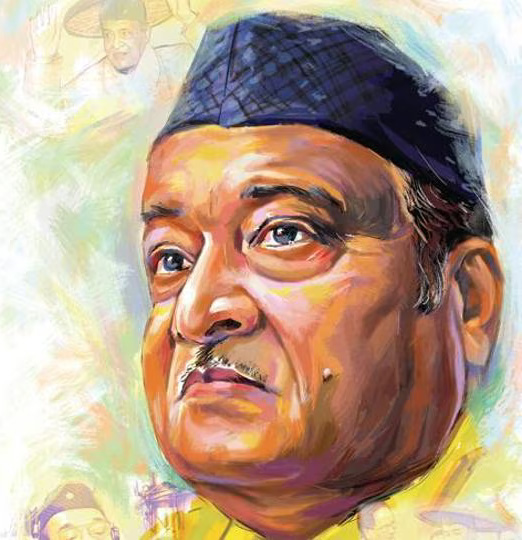Himangshu Ranjan Bhuyan
Dr. Bhupen Hazarika, fondly remembered as Sudhakantha or the “Nightingale of Assam,” stands as one of the most celebrated cultural icons of India’s Northeast. A singer, composer, poet, filmmaker, and social activist, Hazarika’s legacy transcends Assam, reaching national and international audiences. As we mark the centenary of his birth on September 8, 1926, it is timely to reflect on the lasting impact of his life, works, and vision. Born in Sadiya to Nilakanta and Shantipriya Hazarika, Bhupen grew up immersed in Assam’s diverse cultural milieu. His childhood in Guwahati, Dhubri, and Tezpur exposed him to devotional borgeets, folk music, and community traditions. A turning point came in Tezpur when cultural stalwarts Jyotiprasad Agarwala and Bishnu Prasad Rabha discovered his talent. This encounter set him on a path that would bridge Assamese traditions with universal themes. Hazarika’s songs reflected the pulse of the land—the rivers, forests, and people of Assam. Yet they transcended geography, addressing human struggles and the need for compassion. Manuhe Manuhor Babe urged people to care for one another, while Mahabahu Brahmaputra immortalized the river as both life-giver and witness to Assam’s history. His ability to blend the local with the universal gave his music timeless appeal. Aligned with the progressive ideals of the Indian People’s Theatre Association (IPTA), Hazarika believed in art as a vehicle for justice and unity. His lyrics often spoke of poverty, inequality, and communal harmony, making him not just a singer but a social reformer. Hazarika’s influence extended to cinema. He directed and composed for films like Era Bator Sur (1956), Shakuntala (1960), and Pratidhwani (1964), which showcased Assamese heritage while addressing social issues. Documentaries such as Emuthi Saular Kahini on Assam’s cooperative movement revealed his vision of cinema as education. His music for Hindi films, including Rudali and Daman, introduced Assam’s folk traditions to wider audiences, cementing his role as a cultural ambassador. Hazarika’s work celebrated Assam’s ethnic mosaic—the Mising, Karbi, Bodo, and others—alongside neighboring states. By singing in Assamese, Bengali, and Hindi, he bridged linguistic divides and fostered unity. His time at Columbia University, where he engaged in cross-cultural exchanges, enriched his global outlook while deepening his regional identity. Beyond the arts, Hazarika contributed as an educator and leader. He briefly taught at Gauhati University, composing its anthem Jilikaba Luitare Paar. His tenure as an MLA in 1967 and as president of the Assam Sahitya Sabha in 1993 underscored his dedication to cultural preservation and Assamese pride. Hazarika’s global reach was evident in performances abroad, where his songs resonated with universal themes of love, peace, and human dignity. His Bharat Ratna in 2019 affirmed his status as one of India’s greatest cultural ambassadors. Centenary celebrations across Assam, including oration series, exhibitions, and Red Ribbon Clubs in schools, highlight his enduring resonance. Scholars call for incorporating his works into curricula, ensuring that future generations understand his role in shaping Assam’s identity. Hazarika’s emphasis on empathy, environmental stewardship, and cultural pride remains relevant in today’s fractured world. His songs are not just echoes of the past but calls to action for unity and compassion. Dr. Bhupen Hazarika’s voice, like the Brahmaputra he so often sang about, continues to flow—nourishing culture, inspiring social change, and uniting diverse peoples. His art was more than music; it was a movement for humanity. As we honor his centenary, we must carry forward his vision of a world where creativity bridges divides and empathy defines progress.

